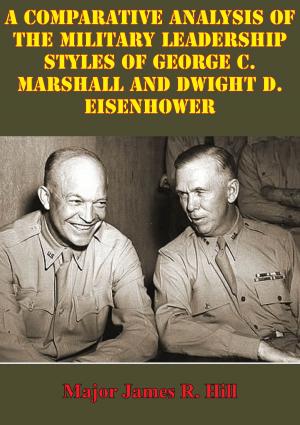Tactical Victory Leading To Operational Failure: Rommel In North Africa
Nonfiction, History, Germany, European General, Military, United States| Author: | Major Jeffrey L. LaFace | ISBN: | 9781782898047 |
| Publisher: | Lucknow Books | Publication: | August 15, 2014 |
| Imprint: | Lucknow Books | Language: | English |
| Author: | Major Jeffrey L. LaFace |
| ISBN: | 9781782898047 |
| Publisher: | Lucknow Books |
| Publication: | August 15, 2014 |
| Imprint: | Lucknow Books |
| Language: | English |
Since the end of the Cold War, the worldview is that the US is presently the only superpower. The expectation, within the Department of Defense and the world's other military institutions, is that this status will exist for the next twenty years or until the year 2020. Even as the world's only superpower, the U. military has adopted a formal approach to joint and coalition warfare as the methodology to fight future military conflicts. This is for two reasons. The first reason is to gain world and national political consensus and legitimacy for any operation requiring the use of US military forces. The second reason is even the military resources of the US are limited and we must conduct military operations as part of a joint coalition force in order to reach our and the coalition's political endstate.
This monograph asks the question: Can tactical victories guarantee the accomplishment of the coalition's operational aim? This monograph will use the example of the Afrika Korps in North Africa to answer this question. The purpose of the monograph is to show the outcome when a more militarily capable member of a coalition dictates the conduct of military operations. This consideration is relevant to the US Army due to our superpower status and our military capabilities relative to the rest of the world's military organizations. The monograph will show that Rommel's reliance on the tactical level of war and his lack of an operational understanding of what he was attempting to accomplish lead to their defeat in North Africa. Rommel's conducted tactical operations because he was not trained for or capable of conducting operational art. Because of this, he failed to support the strategic and operational aims of the political and military leadership. He lacked the cognitive creativity and therefore, the tension to support his government. Rommel's opportunism led to many victories on the battlefield but ultimately had an adverse effect on the Axis war effort.
Since the end of the Cold War, the worldview is that the US is presently the only superpower. The expectation, within the Department of Defense and the world's other military institutions, is that this status will exist for the next twenty years or until the year 2020. Even as the world's only superpower, the U. military has adopted a formal approach to joint and coalition warfare as the methodology to fight future military conflicts. This is for two reasons. The first reason is to gain world and national political consensus and legitimacy for any operation requiring the use of US military forces. The second reason is even the military resources of the US are limited and we must conduct military operations as part of a joint coalition force in order to reach our and the coalition's political endstate.
This monograph asks the question: Can tactical victories guarantee the accomplishment of the coalition's operational aim? This monograph will use the example of the Afrika Korps in North Africa to answer this question. The purpose of the monograph is to show the outcome when a more militarily capable member of a coalition dictates the conduct of military operations. This consideration is relevant to the US Army due to our superpower status and our military capabilities relative to the rest of the world's military organizations. The monograph will show that Rommel's reliance on the tactical level of war and his lack of an operational understanding of what he was attempting to accomplish lead to their defeat in North Africa. Rommel's conducted tactical operations because he was not trained for or capable of conducting operational art. Because of this, he failed to support the strategic and operational aims of the political and military leadership. He lacked the cognitive creativity and therefore, the tension to support his government. Rommel's opportunism led to many victories on the battlefield but ultimately had an adverse effect on the Axis war effort.




![Cover of the book Machine Gunner’s Notes, France 1918 [Illustrated Edition] by Major Jeffrey L. LaFace](https://www.kuoky.com/images/2014/august/300x300/9781782895671-tXJO_300x.jpg)
![Cover of the book I Dream Of The Day - Letters From Caleb Milne - Africa, 1942-1943 [Illustrated Edition] by Major Jeffrey L. LaFace](https://www.kuoky.com/images/2014/august/300x300/9781782895602-vFFF_300x.jpg)


![Cover of the book On The Road To Kut, A Soldier’s Story Of The Mesopotamian Campaign [Illustrated Edition] by Major Jeffrey L. LaFace](https://www.kuoky.com/images/2014/june/300x300/9781782891758-zjOL_300x.jpg)
![Cover of the book Frank Maxwell Brig-General, V.C., C.S.I., D.S.O. - A Memoir And Some Letters [Illustrated Edition] by Major Jeffrey L. LaFace](https://www.kuoky.com/images/2015/november/300x300/9781786255488-zSsR_300x.jpg)
![Cover of the book With The Twenty-Ninth Division In Gallipoli, A Chaplain's Experiences. [Illustrated Edition] by Major Jeffrey L. LaFace](https://www.kuoky.com/images/2013/january/300x300/9781782891000-ek7d_300x.jpg)
![Cover of the book The AAF In The Invasion Of Southern France [Illustrated Edition] by Major Jeffrey L. LaFace](https://www.kuoky.com/images/2014/august/300x300/9781782894650-JNFf_300x.jpg)



